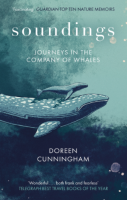January 30, 2023
In her prize-winning debut ‘Soundings’, out this week in paperback, DOREEN CUNNINGHAM tells how she and her young son, Max, follow migrating grey whales from the lagoons of Mexico to the glaciers of the Arctic. She wants to teach him what freedom feels like, to share with him the inspiration she draws from undersea life, and to find a place where they can both belong. In this extract, taken from the prologue, she fears that the whales are going to prove elusive

Wind spits spray in my face. Water slops against the sides of our small fishing boat as it shudders out of the harbour, into a dawn that billows fire above and below the horizon. Max, my two-year-old, is up front ‘helping’ drive the boat. I met the skipper, Chris, just twelve hours ago. We are borrowing a dad, one who has lived at sea and might be able to open a door into this secretive ocean. Today there is one last chance for things to go right. There is nothing to do except trust in this generous stranger, give myself over to the wind and the water, keep my eyes fixed on the waves, examining every curve, every roll, every swirl, every ripple.
‘Look that old rust bucket,’ shouts Max from inside the cabin, pointing. We are cruising slowly past the blue-and-white rust-streaked hulk of a commercial fishing boat. He’s channelling Grandpa Pig arguing with Grandad Dog from the Peppa Pig cartoon. The boat’s name, FAITH, is written in strident white capital letters on the bow. I have to look away. I have lost faith in my idea of following the grey whale migration, in the whales themselves and most of all in myself. I wanted to show Max how the mothers and calves travel thousands of miles from the lagoons of Baja California in Mexico to the Arctic Ocean, to prove to him that it is possible to do anything, to overcome anything, with just the two of us. It was me who needed convincing, though, and things haven’t gone to plan.
Kodiak Island, our final stop, is a major milestone on the grey whale highway and is our last chance to see them before we have to leave. On the map, the island looks as though it’s been carelessly thrown from the Alaskan mainland, as carelessly as I’ve thrown away ten thousand pounds of bank loan to finance this trip. Our visas are spent too. The journey was supposed to help me start anew. It distracted me for a while, but now that it’s ending I’m confronted by all I ran from, a list of my failings.
I failed to set up a life for us that I could tolerate, failed to earn enough money to support us, failed to just get on with it like everyone else. I’ve failed repeatedly and spectacularly at love and of course failed to see what a stupid idea this journey was in the first place. I’m reeling with so much failure that my legs are unsteady and I grip the side of the boat, press my hands onto the wood. My fingers leave no impression. We slide past Arctic Hunter, Resolution, Provider and Lady Kodiak on the final row of moorings. The boat throttles up. The water gets agitated. We creep out from behind a hook of land. The sea, which is now a jagged industrial grey, withholds judgement, unlike me. It could drown me without it being anything personal. Its indifference is comforting. The freezing rip of air anaesthetises the sorrow in my chest. The moving mass of water that backs with a noise like thunder against the far-off cliffs drowns out my headwreck.
Max is sitting on Chris’s knee, a small pair of hands and a large pair of hands in company on the wheel, guiding our course. Max is enjoying himself so much he hasn’t called for me once. I see the corner of a wide smile, round cheek framed by blond tangles and the ruff of his hood. He turns and fixes his eyes on me. Large, slightly elongated and usually blue, they are softened to grey by the light from the clouds.
The island shuttles off through the ocean behind us. This is the Gulf of Alaska, where the Bering Sea breaks its back on the Aleutian Islands, which stretch westwards towards Russia. The Unangan or Aleut people call one of these islands The Birth Place of the Winds. Chris, who used to be a fisherman and is now a landlocked electrician, is treating himself to a fishing trip for Father’s Day. His wife and their two young daughters bump happily on the benches in the cabin as we skitter across the swells. Max and I are tagging along because Chris says he knows where the grey whales feed.
As well as being home to the ominous spectre that is the Kodiak bear and this miraculously kind family, the island is special for its benthic mud. So far, the place has been shrouded in too much fog to spot any sea life, and in my dispirited mood the cold sludge at the bottom of the sea invites me. I hold on to the gunwale and close my eyes, sink down through layers of water in my mind.
I am the whale diving. The light shrinks to a shining hole above. My blood-pump slows, lungs close, body shuts down. Colour slips away. I’m lost in a deep mist. I hear the ocean floor, twisting, flowing. Water sizzles, hums with life, shrimps snap. I probe the dark for voices, call out, try to summon the greys.
Scientist now, I examine the muck, a teeming city of multitudes. Clams surf the currents or dig in with their feet, ribbon worms writhe and slip. A fork-tailed comma shrimp, Diastylidae, a cumacean, swarms and spawns. These tiny shrimp are the prize the whales have travelled so far to gorge on. It’s hard to believe such giants are sustained by prey only millimetres long. Mud plumes spew like lava flows as they suck up the sea floor and extrude silt through a curtain of baleen plates. With shifts in the ocean due to climate change, grey whales can’t afford to be fussy about their diet. The cumaceans they feed on here are a less calorific and crustier shrimp than the one the whales prefer. Luckily they’re basically vacuum cleaners.
I’ve learned a lot about greys on this journey. I’ve read whenever Max has slept. You are unique and spectacular beings, sentinels of the sea, ecosystem engineers, harbingers of the climate change that will affect us all. But where the fuck are you? How could you let me down?

© Doreen Cunningham 2022
Extracted from Soundings: Journeys in the Company of Whales by Doreen Cunningham (Virago, £10.99)
Doreen Cunningham is an Irish-British writer born in Wales. After studying engineering, she worked in climate-related research at the Natural Environment Research Council and in storm-modelling at Newcastle University, before turning to journalism. She worked for 20 years for the BBC World Service, variously as a presenter, editor, producer and reporter. Soundings, which is her first book, won the Royal Society of Literature’s Giles St Aubyn Award; it was also long-listed for the Wainwright Prize for Writing on Conservation and short-listed for the Eccles Centre & Hay Festival Writer’s Award.
